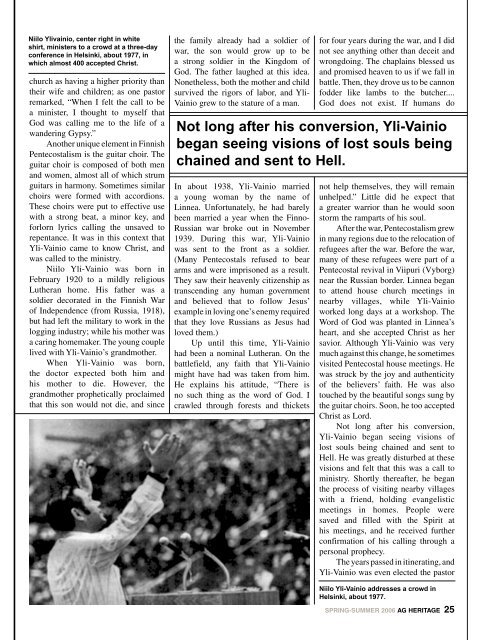2006_01
2006_01
2006_01
Create successful ePaper yourself
Turn your PDF publications into a flip-book with our unique Google optimized e-Paper software.
Niilo Ylivainio, center right in white<br />
shirt, ministers to a crowd at a three-day<br />
conference in Helsinki, about 1977, in<br />
which almost 400 accepted Christ.<br />
church as having a higher priority than<br />
their wife and children; as one pastor<br />
remarked, “When I felt the call to be<br />
a minister, I thought to myself that<br />
God was calling me to the life of a<br />
wandering Gypsy.”<br />
Another unique element in Finnish<br />
Pentecostalism is the guitar choir. The<br />
guitar choir is composed of both men<br />
and women, almost all of which strum<br />
guitars in harmony. Sometimes similar<br />
choirs were formed with accordions.<br />
These choirs were put to effective use<br />
with a strong beat, a minor key, and<br />
forlorn lyrics calling the unsaved to<br />
repentance. It was in this context that<br />
Yli-Vainio came to know Christ, and<br />
was called to the ministry.<br />
Niilo Yli-Vainio was born in<br />
February 1920 to a mildly religious<br />
Lutheran home. His father was a<br />
soldier decorated in the Finnish War<br />
of Independence (from Russia, 1918),<br />
but had left the military to work in the<br />
logging industry; while his mother was<br />
a caring homemaker. The young couple<br />
lived with Yli-Vainio’s grandmother.<br />
When Yli-Vainio was born,<br />
the doctor expected both him and<br />
his mother to die. However, the<br />
grandmother prophetically proclaimed<br />
that this son would not die, and since<br />
the family already had a soldier of<br />
war, the son would grow up to be<br />
a strong soldier in the Kingdom of<br />
God. The father laughed at this idea.<br />
Nonetheless, both the mother and child<br />
survived the rigors of labor, and Yli-<br />
Vainio grew to the stature of a man.<br />
In about 1938, Yli-Vainio married<br />
a young woman by the name of<br />
Linnea. Unfortunately, he had barely<br />
been married a year when the Finno-<br />
Russian war broke out in November<br />
1939. During this war, Yli-Vainio<br />
was sent to the front as a soldier.<br />
(Many Pentecostals refused to bear<br />
arms and were imprisoned as a result.<br />
They saw their heavenly citizenship as<br />
transcending any human government<br />
and believed that to follow Jesus’<br />
example in loving one’s enemy required<br />
that they love Russians as Jesus had<br />
loved them.)<br />
Up until this time, Yli-Vainio<br />
had been a nominal Lutheran. On the<br />
battlefield, any faith that Yli-Vainio<br />
might have had was taken from him.<br />
He explains his attitude, “There is<br />
no such thing as the word of God. I<br />
crawled through forests and thickets<br />
for four years during the war, and I did<br />
not see anything other than deceit and<br />
wrongdoing. The chaplains blessed us<br />
and promised heaven to us if we fall in<br />
battle. Then, they drove us to be cannon<br />
fodder like lambs to the butcher....<br />
God does not exist. If humans do<br />
Not long after his conversion, Yli-Vainio<br />
began seeing visions of lost souls being<br />
chained and sent to Hell.<br />
not help themselves, they will remain<br />
unhelped.” Little did he expect that<br />
a greater warrior than he would soon<br />
storm the ramparts of his soul.<br />
After the war, Pentecostalism grew<br />
in many regions due to the relocation of<br />
refugees after the war. Before the war,<br />
many of these refugees were part of a<br />
Pentecostal revival in Viipuri (Vyborg)<br />
near the Russian border. Linnea began<br />
to attend house church meetings in<br />
nearby villages, while Yli-Vainio<br />
worked long days at a workshop. The<br />
Word of God was planted in Linnea’s<br />
heart, and she accepted Christ as her<br />
savior. Although Yli-Vainio was very<br />
much against this change, he sometimes<br />
visited Pentecostal house meetings. He<br />
was struck by the joy and authenticity<br />
of the believers’ faith. He was also<br />
touched by the beautiful songs sung by<br />
the guitar choirs. Soon, he too accepted<br />
Christ as Lord.<br />
Not long after his conversion,<br />
Yli-Vainio began seeing visions of<br />
lost souls being chained and sent to<br />
Hell. He was greatly disturbed at these<br />
visions and felt that this was a call to<br />
ministry. Shortly thereafter, he began<br />
the process of visiting nearby villages<br />
with a friend, holding evangelistic<br />
meetings in homes. People were<br />
saved and filled with the Spirit at<br />
his meetings, and he received further<br />
confirmation of his calling through a<br />
personal prophecy.<br />
The years passed in itinerating, and<br />
Yli-Vainio was even elected the pastor<br />
Niilo Yli-Vainio addresses a crowd in<br />
Helsinki, about 1977.<br />
SPRING-SUMMER <strong>2006</strong> AG HERITAGE 25


